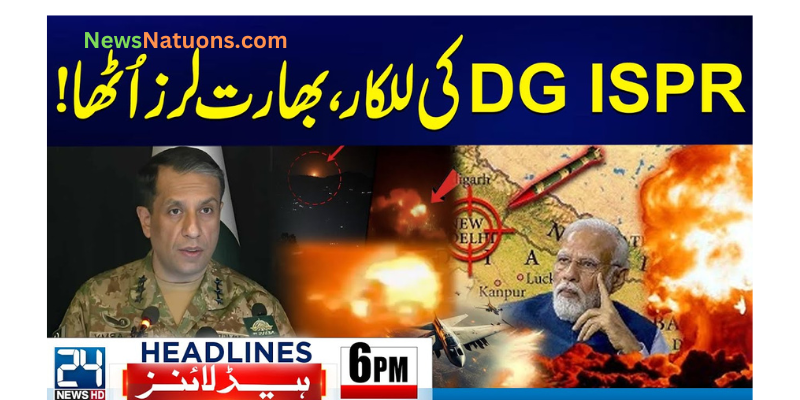Tensions between Pakistan and India have once again surfaced following remarks from Indian officials regarding the 2003 ceasefire agreement. The Line of Control (LoC), which has witnessed decades of conflict and skirmishes, is once again under global attention. This time, the spotlight is on the statement issued by Pakistan’s Director General of Inter-Services Public Relations (DG ISPR), who responded sharply to Indian claims and concerns.
The 2003 ceasefire agreement was a major breakthrough between the two nuclear-armed neighbors. It aimed to bring stability and peace to the region, particularly along the LoC. Despite numerous violations from both sides over the years, the agreement had remained a reference point for diplomatic and military communication. However, the tone of recent exchanges suggests that the fragile peace might be under threat once again.
India’s Statements Trigger Diplomatic Alarm
Recently, Indian defense authorities made public statements that hinted at the possibility of India reassessing its commitment to the ceasefire if what they termed “provocations” from Pakistan did not stop. These remarks, widely covered by Indian media, painted a picture of Pakistan as the aggressor and tried to justify a potential shift in India’s military stance along the LoC.
The Indian narrative, while firm, lacked substantial evidence according to Pakistani officials. This led to immediate concern in Pakistan, prompting a timely and direct response from the military spokesperson. The comments from India were seen not only as provocative but also as a possible prelude to increased cross-border tension.
DG ISPR’s Strong Response to Indian Allegations
Major General Ahmed Sharif Chaudhry, Pakistan’s DG ISPR, did not hold back in his response. Addressing the media and issuing an official statement, he categorically denied all allegations of ceasefire violations from the Pakistani side. According to him, Pakistan has always shown restraint and responsibility in adhering to the terms of the agreement, despite frequent Indian provocations.
He emphasized that any attempts to shift blame onto Pakistan were misleading and politically motivated. General Chaudhry warned India against creating unnecessary drama at the LoC to distract from internal issues or to garner nationalist sentiments ahead of elections. His tone was firm, and his message was clear: Pakistan will not tolerate baseless accusations, and any threat to regional peace will be met with a strong defense.
Pakistan’s Stance on Regional Peace and Stability
In his address, DG ISPR reiterated Pakistan’s commitment to regional peace and stability. He stated that Pakistan has always stood for dialogue and peaceful resolution of all outstanding disputes, including Kashmir. However, this commitment to peace should not be mistaken for weakness.
Pakistan’s military has the capability and the will to respond to any act of aggression, and the LoC is under constant monitoring. The statement also pointed out that the Pakistan Army is fully prepared to defend its borders and will retaliate with full force if provoked.
Reactions from Political and Civil Circles
The DG ISPR’s comments received strong backing from political leaders across Pakistan. Government ministers and opposition figures alike praised the military for its firm but measured response. Many echoed the sentiment that peace is a two-way street and that any unilateral narrative from India will not help in improving bilateral relations.
Civil society also responded to the situation with concern. Analysts on both sides of the border warned against escalation, urging both governments to act with maturity and foresight. Media houses and peace activists have also called for restraint and urged both sides to uphold the ceasefire agreement with sincerity.
The Road Ahead: Will Peace Prevail?
The current scenario brings a familiar sense of uncertainty to South Asia. While both nations have much to gain from maintaining peace, nationalistic rhetoric and political interests often take precedence. The international community, including the United Nations and neighboring countries, is watching closely.
There is hope that this war of words will not translate into another cycle of violence. The world has seen enough of conflict in this region, and further escalation would be detrimental not only to Pakistan and India but to global peace efforts as well. The DG ISPR’s statement was not just a defense of Pakistan’s position; it was also a call for responsibility and restraint.
پاکستان اور بھارت کے درمیان کشیدگی ایک بار پھر سرخیوں میں ہے، خصوصاً 2003 کے سیز فائر معاہدے سے متعلق بھارتی حکام کے حالیہ بیانات کے بعد۔ لائن آف کنٹرول، جو کئی دہائیوں سے جھڑپوں اور تصادم کا مرکز رہی ہے، ایک بار پھر عالمی توجہ کا مرکز بن گئی ہے۔ اس بار توجہ پاکستان کے ڈی جی آئی ایس پی آر کے بیان پر مرکوز ہے جنہوں نے بھارت کے الزامات پر سخت ردعمل دیا۔
2003 کا سیز فائر معاہدہ دونوں ایٹمی ممالک کے درمیان ایک اہم پیش رفت تھی۔ اس کا مقصد خطے میں خصوصاً ایل او سی پر امن اور استحکام لانا تھا۔ اگرچہ ان سالوں میں کئی بار خلاف ورزیاں ہوئیں، لیکن معاہدہ ہمیشہ ایک بنیاد کے طور پر موجود رہا۔ تاہم حالیہ بیانات سے لگتا ہے کہ یہ نازک امن ایک بار پھر خطرے میں ہے۔
بھارت کے بیانات اور سفارتی تشویش
حال ہی میں بھارتی دفاعی حکام نے ایسے بیانات دیے جن میں عندیہ دیا گیا کہ اگر پاکستان کی جانب سے مبینہ “اشتعال انگیزی” نہ رکی تو بھارت سیز فائر معاہدے پر اپنے موقف پر نظرثانی کر سکتا ہے۔ ان بیانات کو بھارتی میڈیا نے خوب کوریج دی اور پاکستان کو جارح ملک کے طور پر پیش کیا۔
پاکستانی حکام کے مطابق یہ الزامات حقائق سے عاری ہیں۔ اس صورتحال پر پاکستان نے فوری ردعمل دیا اور ڈی جی آئی ایس پی آر نے براہ راست اور واضح الفاظ میں بھارت کو جواب دیا۔ بھارتی بیانات کو نہ صرف اشتعال انگیز قرار دیا گیا بلکہ ان کو ممکنہ طور پر اندرونی سیاسی مقاصد کے لیے استعمال کیا جا رہا ہے۔
ڈی جی آئی ایس پی آر کا سخت ردعمل
میجر جنرل احمد شریف چوہدری، ڈی جی آئی ایس پی آر، نے میڈیا سے گفتگو کرتے ہوئے بھارت کے الزامات کو مکمل طور پر مسترد کیا۔ انہوں نے واضح کیا کہ پاکستان ہمیشہ سیز فائر معاہدے کی پاسداری کرتا رہا ہے، باوجود اس کے کہ بھارت کی جانب سے اکثر خلاف ورزیاں ہوتی رہیں۔
انہوں نے کہا کہ پاکستان پر الزام لگانا گمراہ کن اور سیاسی مقاصد کے تحت ہے۔ انہوں نے بھارت کو خبردار کیا کہ ایل او سی پر ڈرامہ رچانے کی کوشش نہ کرے کیونکہ پاکستان کی خاموشی کو کمزوری نہ سمجھا جائے۔ انہوں نے کہا کہ اگر بھارت نے کسی بھی قسم کی جارحیت کی تو اس کا بھرپور جواب دیا جائے گا۔
پاکستان کا خطے میں امن و استحکام پر مؤقف
اپنے بیان میں ڈی جی آئی ایس پی آر نے اس بات کو دہرایا کہ پاکستان ہمیشہ خطے میں امن کا خواہاں رہا ہے۔ پاکستان نے ہمیشہ مسائل کے پرامن حل کی کوشش کی ہے، خاص طور پر کشمیر کے مسئلے پر۔ لیکن امن کی خواہش کو کمزوری سمجھنا غلط ہوگا۔
انہوں نے کہا کہ پاکستان کی افواج مکمل طور پر تیار ہیں اور ایل او سی کی کڑی نگرانی کی جا رہی ہے۔ اگر کسی بھی قسم کی جارحیت ہوئی تو اس کا فوری اور سخت جواب دیا جائے گا۔
سیاسی و عوامی حلقوں کا ردعمل
ڈی جی آئی ایس پی آر کے بیان کو پاکستان کے سیاسی حلقوں سے مکمل حمایت ملی۔ حکومتی وزرا اور اپوزیشن رہنماؤں نے بھی اس مؤقف کو سراہا اور کہا کہ امن باہمی تعاون سے قائم ہوتا ہے، یکطرفہ بیانات سے نہیں۔
عوامی حلقوں اور تجزیہ کاروں نے بھی اس صورتحال پر تشویش کا اظہار کیا۔ دونوں ممالک کے درمیان کشیدگی کو کم کرنے کے لیے عقل مندی اور دور اندیشی کی ضرورت ہے۔ میڈیا اور امن کے خواہاں حلقوں نے بھی سیز فائر معاہدے کی پاسداری پر زور دیا ہے۔
مستقبل کی راہ: کیا امن ممکن ہے؟
موجودہ حالات نے ایک بار پھر جنوبی ایشیا میں غیر یقینی صورتحال کو جنم دیا ہے۔ اگرچہ دونوں ممالک کو امن سے فائدہ ہوگا، لیکن قومی مفادات اور سیاسی تقاریر اکثر حاوی ہو جاتی ہیں۔ بین الاقوامی برادری بھی اس صورتحال پر گہری نظر رکھے ہوئے ہے۔
امید کی جا رہی ہے کہ یہ لفظی جنگ کسی نئے تصادم میں تبدیل نہ ہو۔ دنیا نے اس خطے میں کافی خونریزی دیکھی ہے، اور کسی بھی نئی کشیدگی سے صرف دونوں ممالک ہی نہیں بلکہ عالمی امن کو بھی نقصان پہنچے گا۔ ڈی جی آئی ایس پی آر کا بیان نہ صرف پاکستان کا دفاع تھا بلکہ ایک ذمہ داری اور برداشت کا پیغام بھی تھا۔











